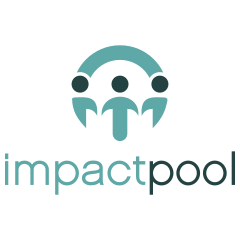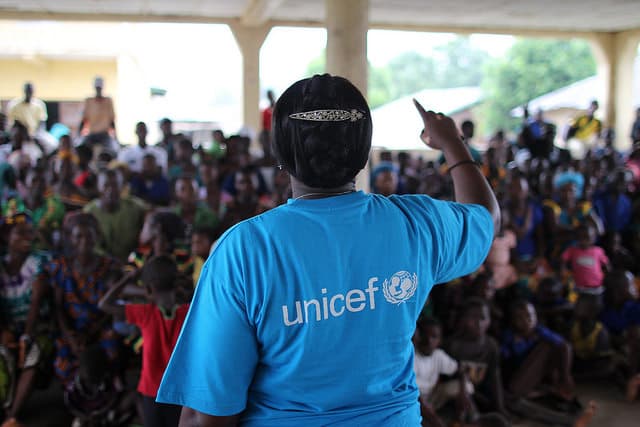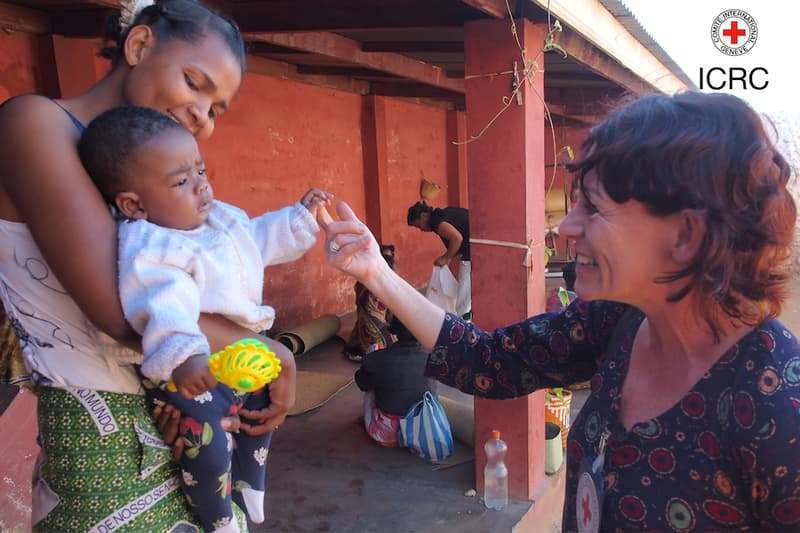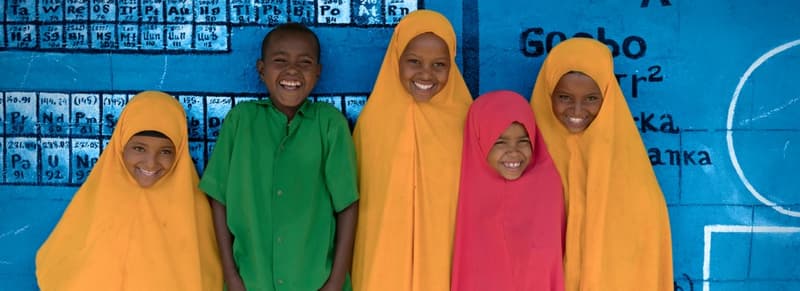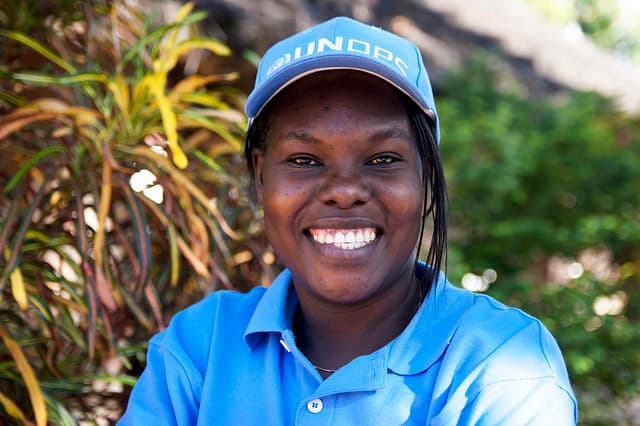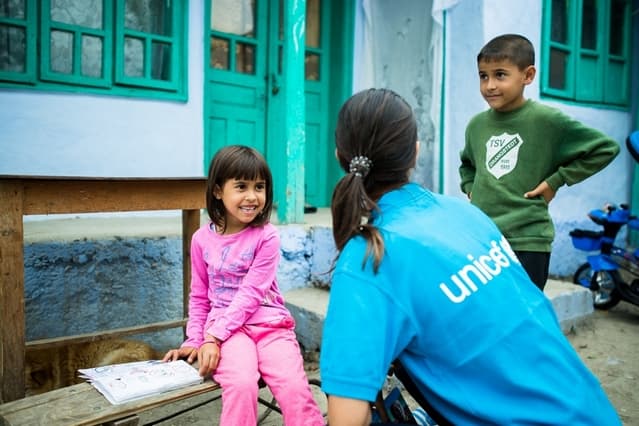National Education Consultant: Education in Emergency/ Safe Schools (Neplease Nationals Only)
Kathmandu
- Organization: UNICEF - United Nations Children’s Fund
- Location: Kathmandu
- Grade: Consultancy - Consultant - Contractors Agreement
-
Occupational Groups:
- Medical Practitioners
- Humanitarian Aid and Coordination
- Education, Learning and Training
- Emergency Aid and Response
- Closing Date: 2023-12-04
UNICEF Nepal Country Office is looking for an expert to provide technical support under education section. The duration of the contract is for nine months.
UNICEF works in some of the world’s toughest places, to reach the world’s most disadvantaged children. To save their lives. To defend their rights. To help them fulfill their potential.
Across 190 countries and territories, we work for every child, everywhere, every day, to build a better world for everyone.
And we never give up.
For every child, education.
Climate change severely impacts Nepal, ranking as the world's fourth most climate-vulnerable country. At the same time, it is also prone to multi-hazards, ranking 20th in the world. More than 1.9 million Nepali are highly climate vulnerable, 10 million are increasingly at risk, and women and children comprise the most vulnerable groups. Nepal ranks in a high-risk index category with a 5 rating with an increasing risk trend over the past three years. Nepal is ranked 23rd regarding natural hazards, 30th most risky country concerning floods, and 11th most at-risk country concerning earthquakes worldwide. Different climate-induced hazards have been affecting children’s education and learning outcomes. The COVID-19 pandemic has further widened the learning loss of Nepalese children.
After the devastating earthquake that occurred in 2015 and its impact on the Education sector, the Ministry of Education, Science, and Technology (MoEST) endorsed the Comprehensive School Safety Master Plan (2017), aligning with the global Comprehensive School Safety Framework (CSSF) for disaster risk reduction and preparedness to strengthen the resilience of the education sector. School Sector Development Plan (2016/17–2022/23, and School Education Sector Plan (SESP) also envisioned building resilience and strengthening the capacity of schools and communities to prepare for multiple hazards and increasing risks created by climate change and respond to disasters to ensure the continuation of education and sustain safe learning environments. It also envisioned green schools that promote climate-smart actions through education. The CSS Master Plan has further expanded into the three critical guiding documents: CSS Minimum Package (CSSMP-2018), CSS Implementation Guideline-2019, and CSS Communication and Dissemination Strategy. The CSS Implementation Guideline (CSSIG) comprises a range of facilitating tools and techniques to translate the CSS Minimum Package indicators into action, particularly at school and local government levels.
Climate change is a vital component of UNICEF's approach to disaster risk reduction, with climate change adaptation an integral part of risk management in its development and humanitarian programming. For several years, UNICEF has worked to accelerate collective action among development partners and governments to address climate change through the education sector and at the school level. Via the Global Alliance for Disaster Risk Reduction and Resilience in the Education Sector (CADRES), UNICEF has led the updating of the CSSF 2022-2030 to better incorporate climate change action across countries such as Nepal based on local needs and conditions. These efforts focus on utilizing education systems and schools to enhance disaster risk reduction and school safety measures to mitigate the impacts of climate change-induced shocks, strengthen shock responsive, greening school facilities, and promote community-based social action to address context-specific climate change issues. The initiatives are also focused on transformative action by equipping children, young people, and communities with knowledge and skills on climate change.
The Global CSSF (2022-2030) framework has also been updated with four key components: a cross-cutting foundation and three intersecting pillars. Each component is distinguished by specific scope, sets of actors, responsibilities, and strategies. UNICEF will collaborate with the government and partners to update Nepal’s CSSMP to align with the updated global CSSF framework, incorporating climate change education through education.
As the country seeks to recover the learning losses experienced by children during the pandemic and address the broader learning crisis, it is incumbent on all tiers of government to identify appropriate learning recovery strategies in the short term. The Government, in partnership with UNICEF and other education development partners, has developed and initiated the School Education Sector Plan (SESP; 2022-2027), which includes the implementation of the Recovery and Accelerated Learning (ReAL) Plan to facilitate an inclusive recovery of learning loss through need-based and targeted accelerated and remedial learning programs.
Responding to the needs of these children, UNICEF continues to support and advocate for the comprehensive school safety programme encompassing climate smart education and supports the implementation of the ReAL plan at federal, provincial, and targeted provinces.
This will include the following support from UNICEF to government, partners, and field offices:
- Extending technical support to the governments/partners for integration of climate-smart resilient policies in the comprehensive school safety minimum package and its implementation guidelines to ensure continuity of children
- Supporting local government and schools to incorporate climate change action at the school and community level to increase resilience and make meaningful contributions to addressing climate change and its impacts
- Supporting schools to implement ReAL plan in the schools to reduce learning loss of the children
- Technical support to CHERD /partners and local governments for the development of a learning continuity plan in case of emergencies – specific to the current earthquake in Western Nepal.
- Education Section requires a consultant to fulfill the above tasks to support the government and partners.
How can you make a difference?
- Provide technical support to CEHRD and Field Offices for Comprehensive School Safety and education in emergencies (need-based).
- Execute Comprehensive School Safety (CSS) initiatives integrating climate change mitigation and adaptation actions.
- Support to scale up of Recovery and Accelerated Learning (ReAL) plan to adopt learning recovery of children in UNICEF targeted areas
Scope of Work:
The consultant will be expected to undertake the following activities -
- Provide technical support to the section to support the implementation of education emergency response actions in coordination with DRR/Emg section, field offices and partners
- Liaise with the CEHRD and implementing partners to ensure timely inception of activities outlined in the project document relating to Safe Schools and Climate Smart Education.
- Provide technical and administrative support to CEHRD, implementing partners, and Section to conduct workshops and brainstorming sessions at various levels to develop the frameworks, guidelines/tools
- Provide technical inputs to design, observe, and monitor the training sessions for green and climate-smart Education.
- Collaborate with field offices and implementing partners to ensure monitoring and reporting arrangements are in place for periodical reporting
- Draft UNICEF’s strategy to support the ReAL plan
- Disseminate newly drafted or revised documents to UNICEF team members, gather feedback from sectoral colleagues and field offices, and compile consolidated input from UNICEF.
- Follow up with field offices and local governments to ensure planned activities related to CSS and EiE are implemented in line with the agreed framework.
- Compile evidence to illustrate the program's impact, incorporating human interest stories
Task
- Provide technical support for learning continuity of earthquake affected children of West Nepal
- Provide technical and administrative support to CEHRD, partners and Section to conduct workshops and brainstorming sessions at different levels to develop the guidelines/tools
- Develop updated Monitoring checklist of CSS/Green school programme
- Review/provide technical inputs for the CSS documents to align with the updated CSS global framework.
- Provide technical inputs to develop climate-smart and resilient teacher training resources
- Develop case studies and Human-Interest Stories
- Develop UNICEF’s ReAL Plan implementation strategy in consultation with field office education team
- Coordinate- provide technical support to Partner for climate smart green school programme
- Develop costed plan to support scalable CSS/Green School programme
- Conduct brainstorming sessions for the TWG and other stakeholders to support the CSS master plan and CSSMP update process
- Conduct review meeting with partners for green school programme implementation
First Deliverable
- Development of Partnership documents for learning continuity
- Submission of content and methodology of the workshops, consultation meetings
- Submission of monitoring checklist
- Submission of monthly progress report of learning continuity plan.
- Submission of minimum one case study HIS from EQ response
Second Deliverable
- Submission of final draft of Training curriculum and resource material
- Submission of minimum 1 case studies/HIS
- Submission of ReAL Plan Implementation Strategy
- Review status of Green School Programme
Third Deliverable
- Submission of costed Plan of Safe and green schools
- Submission of events reports
- Submission of existence of updated CSS master plan and CSSMP
- Submission of minimum one case study/HIS
- Status report of the green school programme
To qualify as an advocate for every child you will have…
Minimum Qualifications, Knowledge/Expertise/Skills required:
- Advanced university degree in Education or social sciences or discipline relevant to equity and inclusion.
- A minimum of five years of experience working on education projects specific to School Safety, Climate Change, Education in Emergencies, and Learning recovery
- Familiar with the education context of Nepal, including all federal structures
- Sound knowledge of foundational learning activities, acceleration of learning approach, learning continuation campaigns, and disability-inclusive education
- Excellent communication, coordination, and rapport-building skills, including the ability to facilitate diverse groups (Government, CSOs, Technical Expert)
- Strong working knowledge of Nepali and English
- Experience in the capacity building of partners at the national, regional, and district levels
Skills required:
- Strategic thinking, analytical skill, high-level coordination, networking, and facilitation skills
UNICEF is here to serve the world’s most disadvantaged children and our global workforce must reflect the diversity of those children. The UNICEF family is committed to include everyone, irrespective of their race/ethnicity, age, disability, gender identity, sexual orientation, religion, nationality, socio-economic background, or any other personal characteristic.
UNICEF has a zero-tolerance policy on conduct that is incompatible with the aims and objectives of the United Nations and UNICEF, including sexual exploitation and abuse, sexual harassment, abuse of authority and discrimination. UNICEF also adheres to strict child safeguarding principles. All selected candidates will be expected to adhere to these standards and principles and will therefore undergo rigorous reference and background checks. Background checks will include the verification of academic credential(s) and employment history. Selected candidates may be required to provide additional information to conduct a background check.
Remarks:
Individuals engaged under a consultancy or individual contract will not be considered “staff members” under the Staff Regulations and Rules of the United Nations and UNICEF’s policies and procedures and will not be entitled to benefits provided therein (such as leave entitlements and medical insurance coverage). Their conditions of service will be governed by their contract and the General Conditions of Contracts for the Services of Consultants and Individual Contractors. Consultants and individual contractors are responsible for determining their tax liabilities and for the payment of any taxes and/or duties, in accordance with local or other applicable laws.
The selected candidate is solely responsible to ensure health insurance required to perform the duties of the contract are valid for the entire period of the contract. Selected candidates are subject to confirmation of fully-vaccinated status against SARS-CoV-2 (Covid-19) with a World Health Organization (WHO)-endorsed vaccine, which must be met prior to taking up the assignment. It does not apply to consultants who will work remotely and are not expected to work on or visit UNICEF premises, programme delivery locations or directly interact with communities UNICEF works with, nor to travel to perform functions for UNICEF for the duration of their consultancy contracts.
Note: Qualified females and candidates from the under-represented ethnic groups are strongly encouraged to apply.

